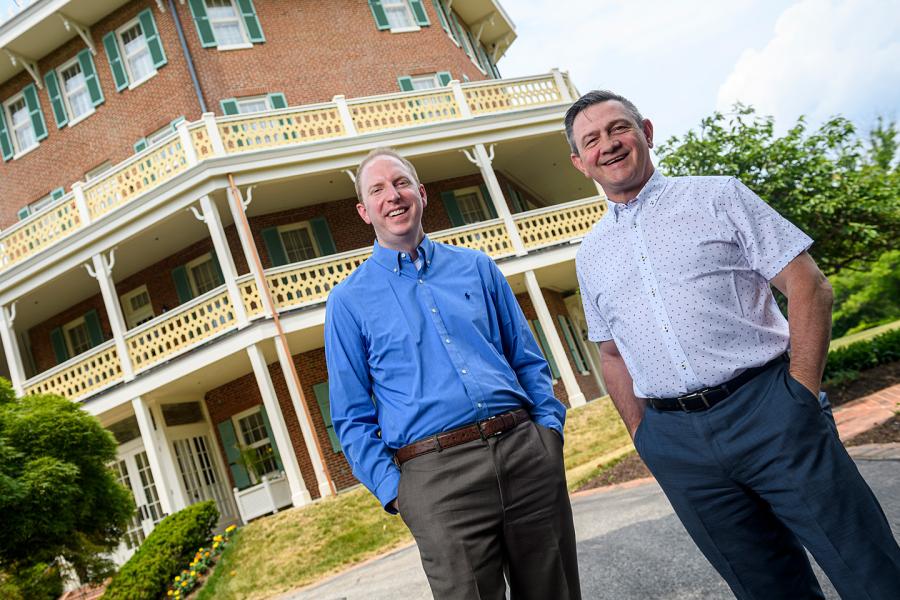Matthew Moss and Ross Fischer are self-described "foodies."
They both love food but express their culinary affections in different ways. Moss likes to cook—and eats what he cooks—while Fischer delights in dining out.
Moss, in fact, built an outdoor oven at his house near Bel Air. "If it were up to me, I would cook outdoors all year long," he says. "It's a traditional pizza oven, but I cook everything in it, from chicken and ribs to corn bread. My wife gives me a hard time because I don't follow recipes. She is detail-oriented and follows recipes to a T. I am the exact opposite. I can go to the pantry and cook you up a fantastic concoction—and you'll never get the same meal twice."
Fischer, on the other hand, admits to having no talent in the kitchen but enjoys living in Maryland, especially Baltimore, "because the seafood is phenomenal," he says. But his food passions don't stop there. "I like all types of cuisine, from pizza to curry and everything in between," he says. "Butter chicken is one of my favorites. Give me some butter chicken and garlic naan and I'm a happy person."
The men's shared appreciation for food is a good thing because the two are tasked with improving the dining experiences of Johns Hopkins University staff and faculty in the coming months and years, especially as the university continues to encourage an increased in-person workplace presence.
"We want people to feel good about being back on campus and—as it is in many aspects of life—food is a big part of that," Moss says. "We like to think our food is for everyone."
Moss, assistant vice provost for dining programs, and Fischer, director of asset management—he oversees the university's real estate properties—are designing and implementing new dining initiatives in response to feedback from Future of Work meetings, town halls, and surveys. Overwhelmingly, the JHU community asked for healthier food choices and more accessibility to them.
The men have different roles in the process. Fischer is responsible for two of the campuses included in the initiatives—Eastern and Mt. Washington, both of which already have several new food options available, an especially welcome change at Mt. Washington because its full-service cafeteria closed during the pandemic and is not slated to reopen in the prior format.
To compensate, those who work on Mt. Washington's south and north campuses as well as at Eastern can now visit food trucks from the Curbside Kitchen group one day a week at each of the three locations, rotating with a changing variety of food choices. They now also have access to Farmer's Fridge vending machines, which feature fresh and healthy food, including salads, sandwiches, bowls, and snacks. "These are trial programs that might become permanent since people are very enthusiastic about them," Fischer says.
For his part, Moss is tackling a series of initiatives for other university staff and faculty, a plan that will revamp their entire dining experience.
Last summer, in a move geared to enhance student dining, the university ended its relationship with Bon Appetit and launched new dining programs at Homewood and Peabody that the university operates itself. But that's not all. Mindful that students aren't the only ones who eat, the university also is implementing changes at Homewood aimed at making dining more inviting and inclusive for staff and faculty.
"Many places were seen as places where only students eat," Moss says. "[Some faculty and staff] felt these facilities were only for those with a meal plan—that the food was there for the students but not for anyone else. They felt that Levering's food hall was the only place accessible to them. It's always there, and it's located on a central part of campus easily walkable from many locations. Most of the other dining locations are on the outskirts of Homewood, and the faculty and staff didn't feel they were easily accessible on a short lunch break. We have prioritized changing that perspective and making food available throughout the campus to staff and faculty."
[Read about summer dining discounts for faculty and staff.]
During the next 18 months, new food locations will be coming to the Homewood campus, Moss says, including a café at the SNF Angora Institute, "a part of the campus where there are no other food locations within easy access," he says.
Moreover, the Hopkins Student Center currently under construction—and expected to open in early 2025—will have six retail locations featuring local restaurants and a café pub, he says. "The emphasis will be on complementing the rest of the food available on campus," Moss says. "For example, we already have pizza at many locations, so it may not make sense to put pizza in there. Maybe we will have traditional Asian entrees or a noodles concept so you will have choices around campus."
Additional planning is underway "to make food more accessible across [the Homewood] campus," as is designing a master housing and dining blueprint "that will help us decide how we build out in the coming years," Moss says.
Moss is a New Zealand native and longtime rugby player who first came to the United States at the urging of his brother—who was then a university student in North Carolina—and to play for a club in Buffalo, New York. But food and dining always have been an integral part of his life. "My mother was in the hotel business, and I always ended up as part of her kitchen team, in the restaurant, cooking breakfast for guests, and helping the culinary people there," he says.
He studied hospitality management at the Wellington Institute of Technology in New Zealand and has over two decades of experience managing hospitality and food operations, including at the 2008 Beijing Olympics. He joined JHU in September 2021.
Fischer, who came to JHU in 2019, began his career in commercial real estate in 2005 with major-market office, retail, and industrial experience in the Washington, D.C. region. Among the fields he covered were asset management, property management, commercial development and construction, business development, acquisitions, and crisis/environmental management. He holds a bachelor's degree in business administration/finance from East Carolina University and a master's degree in business administration/real estate and land development from Virginia Commonwealth University. He lives in Baltimore with his fiancée and, when not dealing with real estate, likes traveling and tinkering with European cars.
Fischer's office is located at Keswick, which had a Farmer's Fridge vending machine installed in its Grab and Go café earlier this year, and he's sampled its food on several occasions. "I've tried the Baja chicken wrap and Cobb salad, and both were great," he says. "They offer good, healthy, convenient food options."
He's also made trips to try out lunch on wheels. "The food trucks offer a wide range of options, from chicken and waffles to Jamaican food to burgers and pizza," he says. "I have been to the trucks because I wanted to see them in action. I thought they were fabulous. I had a cheeseburger and some truffle fries—and they were delicious. I was quite impressed."
He says the trucks have been very well received, and the plan is to vary the choices in the coming weeks. "We will continue to have a good variety going forward," he says. "Maybe even some butter chicken and garlic naan."
Posted in News+Info
Tagged hr newswire









